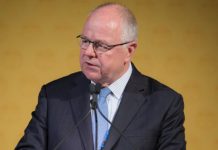
[miningmx.com] — THE chances of First Uranium being afforded a
dignified death seem slim.
The troubled miner earlier this month made its intentions known that it was selling
Mine Waste Solutions and Ezulwini to AngloGold Ashanti and Gold One International
respectively for a combined $405m, whereafter it intends to disappear into mining
oblivion.
The sales amount would only be enough to settle some $320m in debt – in the form
of convertible debenture and note holders – and see $23m going towards operating
and transaction related costs.
Shareholders would be allotted no more than the remaining $62m, which is roughly
$0.26 per share for the company’s 238 million-odd shares in issue, with some bought
at around $11.00 a piece back in 2007.
It therefore shouldn’t come as too big a surprise that some of them are now refusing
to back the sale of Mine Waste Solutions and Ezulwini, saying shareholders are the
proverbial turkeys being asked to vote for Christmas.
“The restructuring is biased towards the debtors and doesn’t take the interests of
shareholders into account at all,’ Mikhail Pak, a spokesperson for Stratton Enterprises
in Moscow, told Miningmx.
Bloomberg reported last week that a First Uranium investor group which
comprises of Pak’s Stratton, as well as Sprott Asset Management and Patto Corporate
Services, may vote against both deals. These companies hold a collective 17% stake
in First Uranium. They are arguing Mine Waste Solutions has a so-called net present
value of C$700m while Ezulwini’s infrastructure is worth $150m.
Their main concern is that First Uranium’s sale of MWS and Ezulwini are being done
too cheaply.
The sentiment was echoed in an email received by Miningmx from an official
at an international financial group.
“Numerous large investors are totally against the crazy deal concocted by the CEO of
First Uranium [Deon van der Mescht] and the board of directors,’ he said. “Those
investment houses have sent a letter to the [directors] instructing them to go back to
the drawing board.
“This is not a done deal; it is not in the least the best deal out there and the
shareholders are organising to defeat the sale and possibly make significant changes
to the board of directors at First Uranium.’
These shareholders do not have a lot of time though to show what they’ve got up
their sleeves. First Uranium convertible debentures worth C$150m are due June 30,
with another C$170m due in March 2013.
Should First Uranium not be able to pay these debts and see those converted into
shares, the company would have to issue approximately 806 million new shares –
more than double the current total – as alternative payment. This total is based on
First Uranium’s trading price at the time of announcing the Gold One/AngloGold
transactions of around $0.17, and doesn’t take cognisance of the fact that the share
price has slipped further to $0.145.
Pak, however, is critical of First Uranium’s efforts to consult with shareholders before
the company had announced the deals. “They only communicated with one
shareholder, which is AngloGold Ashanti [holding 19.9%],’ Pak said, adding that
others could’ve assisted in acquiring the finance which First Uranium needed to see
the company through.
Similarly, he said, the note and debenture holders could also have sacrificed a bit by
agreeing to extend the due dates.
Approached for comment, Van der Mescht admitted “emotions were running high’, but
said he would not engage disgruntled shareholders in a public debate. He said the
company would send out circulars in the first week of May which would explain the
directors’ stance in detail, with voting to take place around the last week of that
month.
“We would’ve considered better options if those were available,’ he said.
He didn’t want to comment when asked whether he’ll consider future superior
alternatives.
When shareholders eventually do vote on the transactions, the sale of Mine Waste
Solutions would need 50.1% or more of the votes cast by shareholders, excluding
AngloGold, Village Main Reef as well as Franco Nevada, which all are related parties.
The Ezulwini deal needs 66.7% approval.








